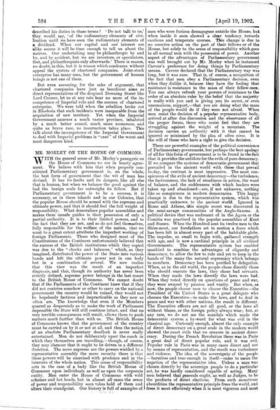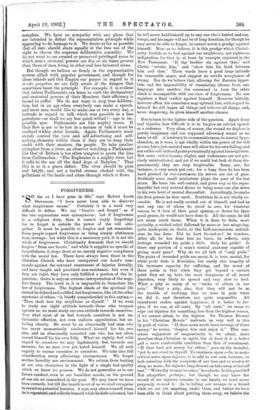MR. MORLEY ON THE HOUSE OF COMMONS.
WITH the general sense of Mr. Morley's panegyric on the House of Commons we are in hearty agree- ment. We believe with him that when properly con- stituted Parliamentary government is, on the whole, the best form of government that the wit of man has devised. It has its faults and its dangers, like all else that is human, but when we balance the good against the bad the benign scale far outweighs its fellow. But if Parliamentary government is to be a success, it is necessary, as in these islands and in our Colonies, that the popular House should be armed with the supreme and ultimate power, and that it should feel the full weight of responsibility. What demoralises popular assemblies and makes them unsafe guides is their possession of only a partial authority. It is to their limited powers, and to the fact that they are not, and so do not feel themselves, fully responsible for the welfare of the nation, that we must to a great extent attribute the imperfect working of foreign Parliaments. Those who designed most of the Constitutions of the Continent unfortunately believed that the success of the British institutions which they copied was due to the " checks and balances," which, as they imagined, distributed the power of the State into various hands and left the ultimate power not in one body but in a combination of several. We now realise that this view was the result of an imperfect diagnosis, and that, though its authority has never been strictly defined, supreme power belongs in the last resort to the British House of Commons. We cannot doubt that if the Parliaments of the Continent knew that if they did not contrive somehow or other to carry on the national government the country would be ruined, they would not be hopelessly factious and impracticable as they now so often are. The Imowledge that even if the Members quarrel so desperately as to make the work of Parliament impossible the State will still continue intact, and that no very terrible consequences will result, allows them to push matters much further than with us. The British House of Commons knows that the government of the country must be carried on by it or not at all, and thus the notion of an absolute Parliamentary deadlock is never really entertained. Men do not deliberately upset the coach in which they themselves are travelling,—though, of course, they may clamour that it ought to be driven in a different direction. The more supreme are the powers wielded by a representative assembly the more security there is that these powerd will be exercised with prudence and in the interests of the whole nation. This sense of responsibility acts in the case of a body like the British House of Commons upon individuals as well as upon the corporate entity. Men enter the House of Commons with wild schemes and hot heads, but in almost all cases the sense of power and responsibility soon takes hold. of them and alters their standpoint. Our historyis'full of examples of men who were furious demagogues outside the House, but when inside it soon showed a clear tendency towards cautious and temperate courses. This change is due to no coercive action on the part of their fellows or of the House, but solely to the sense of responsibility which goes in all normal men with the possession of power. Another aspect of the advantages of Parliamentary government was well brought out by Mr. Morley when he instanced Cavour's preference for doing things by Parliamentary means. Cavour declared that the Parliamentary way was long, but it was sure. That is, of course, a recognition of the fact that men obey a Parliamentary decision, even when they dislike it, because they have the feeling that resistance is resistance to the mass of their fellow-men. You can always refresh your powers of resistance to the order of an absolute ruler by the belief that the majority is really with you and is giving you its secret, or even unconscious, support, —that you are doing what the mass of the people would do if they were not afraid. When men resist the decision of a popular representative body, arrived at after due discussion and the observance of all the proper forms, those who resist feel that they are struggling against the weight of a mountain. The decision carries an authority with it that cannot be ignored or minimised by the plea of ultra wires. It is the will of those who have a right to give the decision.
These are powerful examples of the political convenience of Parliamentary government, but perhaps the best apology of all for this form of government is to be found in the fact that it provides the antidote for the evils of pure democracy. If we compare the systems of democratic government that prevailed in the ancient world with these that prevail to-day, the contrast is most impressive. The most con- spicuous of the evils of ancient democracy—the turbulence, the factiousness, the lack of steadiness in action, the want of balance, and the suddenness with which leaders were taken up and abandoned—are, if not unknown, nothing like so conspicuous in modern democracies. This happy change is due to the representative system, which was practically unknown to the ancient world. Ignored in Rome and Athens, this simple secret was discovered in the semi-savage communities of the .Anglo-Saxons. A political device that was undreamt of in the Agora or the Comitia was practised in the popular assemblies of Kent and Sussex. When the Hundred sent its twelve men to the Shire-moot, our forefathers set in motion a force which has been felt in almost every part of the habitable globe. The impulse, so small to begin with, gathered strength with age, and is now a cardinal principle in all civilised Governments. The representative system has enabled mankind to combine the advantages of oligarchy and democracy, to allow the few to rule and yet to keep in the hands of the many the natural supremacy which belongs to numbers. Democracy has been purified by delegation. When, as in the old world, the people chose directly those who should execute the laws, they chose bad servants. When they made the laws directly the laws were bad. When they voted directly on questions of peace and war, they were swayed by passion and vanity. But when, as now, the people choose men to choose the Executive—the President of the United States is a great delegate who chooses the Executive—to make the laws, and to deal in peace and war with other nations, the result is different. The Executive officers are not all good, or the laws all without blame, or the foreign policy always wise ; but, at any rate, we do not see the scandals which made the democratic system a by-word for what was evil in the classical age. Curiously enough, almost the only example of direct democracy on a great scale in the modern world showed the exact evils that we censure in ancient demo- cracy. During the French Revolution there was in Paris a great deal of direct popular rule, and it was evil. Popular rule in Paris was in many cases direct and not by means of representation, and the result was turbulence and violence. The idea of the sovereignty of the people —harmless and true enough in itself—came to mean the negation of the representative idea. Unless a man was chosen directly by the sovereign people to do a particular act, he was hardly considered capable of acting. Many men believed that generals ought, as well as Judges, to be the products of direct elections. From such monstrous absurdities the representative principle frees the world, and frees it most effectively when it is most vigorous and most complete. We have no sympathy with any plans that are intended to defeat the representative principle while appearing to do homage to it. We desire as far as possible that all men should share equally in the free use of the right to choose the supreme deliberative assembly. We do not want to see created or preserved privileged areas in which men's electoral powers are five or six times greater than those of men living in other and less favoured areas.
But though we believe so firmly in the representative system allied with popular government, and though for these islands and this Empire our prayer in regard to it is esto perpetva, we are fully aware of the dangers that sometimes beset the principle. For example, it is evident that unless Parliaments can learn to curb the declamatory and oratorical powers of their Members their efficiency is bound to suffer. We do not want to stop true delibera- tion, but in an age when everybody can make a speech, and most men would like to make one or two every day, a latitude in regard to talk which was possible in a less garrulous—or shall we say less quick-witted P—age is im- possible now. Parliaments are like mighty rivers. If their flow is not to be lost in a morass of talk it must be confined within strict bounds. Again, Parliaments must sternly control the vain and self-advertising and self- seeking elements within them if they are to keep their credit with their masters, the people. To take another metaphor from a river, an observer watching a Parliament like that of Britain is too often tempted to quote the line from Callimaehus : "The Euphrates is a mighty river, but it rolls to the sea all the dead dogs of Babylon." That this is so is a grave defect. The river should be pure and bright, and not a turbid stream choked with the pollutions of the lands and cities through which it flows.











































 Previous page
Previous page